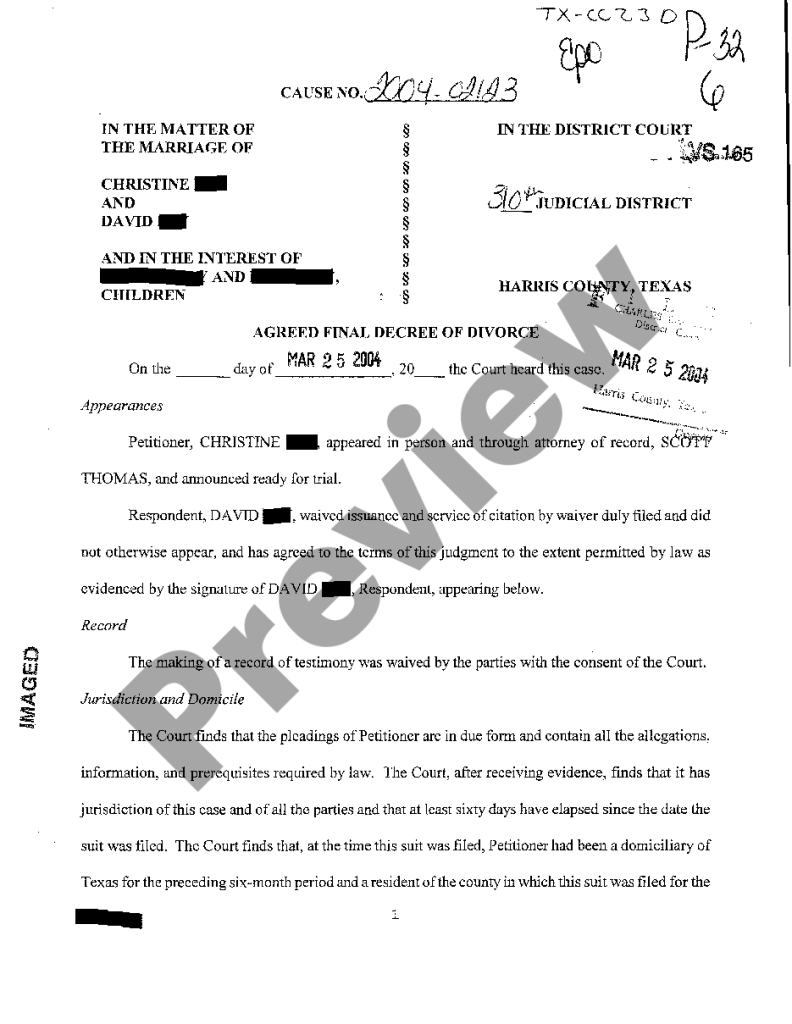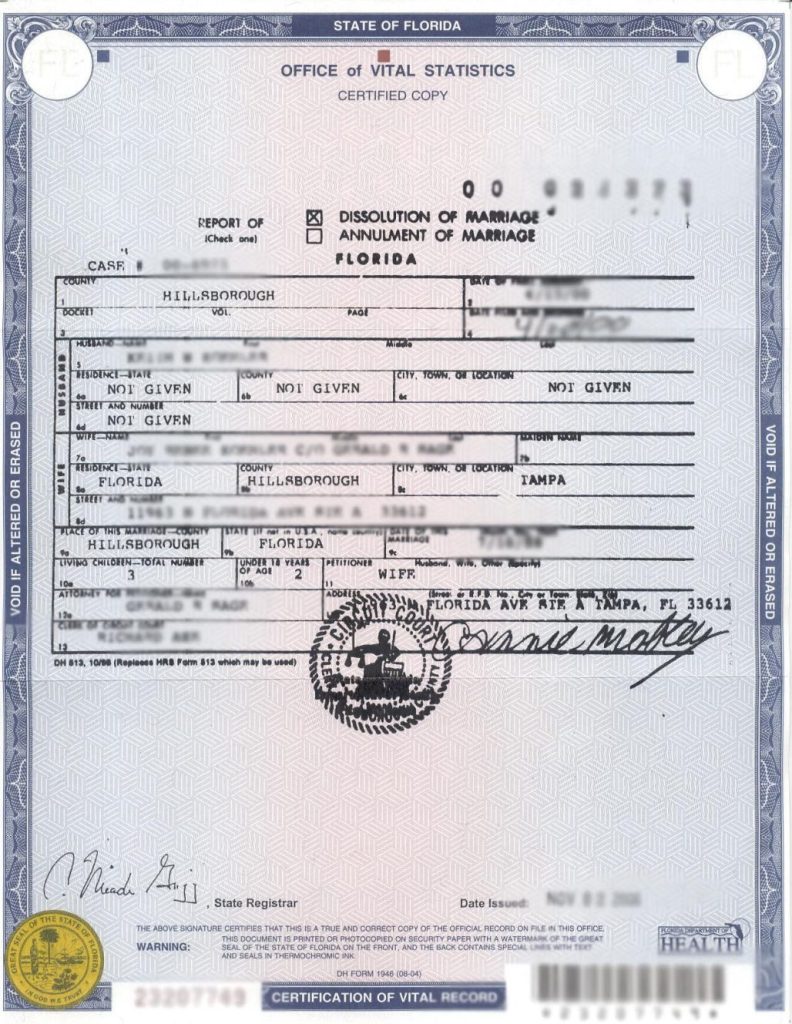With all the different divorce documents floating around, it can be hard to know what’s most important. Each one of the divorce papers serves a different purpose.
- The “divorce decree,” detailing the divorce terms, is issued by the court.
- The “divorce certificate,” a document confirming the divorce, comes from a vital records office, not the court.
In this post, we’ll explore the key differences and uses of two important documents in the divorce process: the divorce decree and the divorce certificate. While both serve critical roles, they originate from different sources and fulfill distinct purposes following the dissolution of a marriage. Understanding these documents can clarify the legal steps taken and what each document signifies in the broader context of finalizing a divorce.
What is a divorce decree?
Contents
A divorce decree is the official document issued by the court that formally ends your marriage. It contains information about your case, including spousal support, child support, custody, visitation, property division, and other information. Most divorce decrees are thorough and contain all of the agreed-upon information in your case, such as who is responsible for getting life and health insurance, if the wife can take her maiden name again, and how you will divide your debt.

If you and your spouse reached an agreement outside of court, then the divorce decree would include the terms of your settlement agreement (instead of court orders).
In some cases, the actual agreement may be spelled out in a separate document called a Marital Settlement Agreement.
If you didn’t go to trial but settled your case instead, the divorce decree will contain the terms of the settlement. The decree still acts as a final judgment, but you and your former spouse have decided upon the terms of your own divorce without the court’s input. Settling your case takes the decision out of the hands of the judge so long as the decision is not outrageous or one-sided. If it’s one-sided, the judge will usually intervene to help you work out the terms of your settlement.
Where do you get a copy of your divorce decree?
A certified copy of a divorce decree is provided by the courts, but if you lose the document, you should be able to complete some paperwork and submit it to the civil court where your divorce took place, as long as you are one of the parties to the divorce.
If you were not a party to the divorce, you may need notarized permission from one of the parties that grants you permission to access the decree. State laws require that courts must keep decrees on file for anywhere from 7 to 10 years.
What Happens After You Get Your Divorce Decree?
After you receive your divorce decree, you’ll want to make sure you’re obeying the decree and that your former spouse is, too.
After you get your divorce decree, make sure to:
- Read the decree for accuracy
- Ask your attorney if you have any questions
- File an appeal immediately if you’re not happy with the judge’s decision after a trial
- Change your will
- Change beneficiaries on your insurance policies
- Update emergency contacts for your child’s school
- Change your power of attorney
- Put savings and checking accounts in your name only
- Cancel or change credit cards
- Bring your former spouse back to court if the former spouse is violating the decree
- Bring the case back to court if you need to change spousal or child support later on
What is a divorce certificate?
A divorce certificate also known as proof of divorce, is a completely different document from a divorce decree. A certificate is not prepared by a court. Is much less detailed than a decree and only provides minimal information such as the names of the two spouses and the date and place a divorce was granted, but typically no other information.

In many cases, rather than having to produce a detailed decree, a divorce certificate may meet the requirements for a variety of legal purposes. It is most commonly used when someone wants to change their name or they want to get remarried.
Unlike a lengthy divorce decree, a divorce certificate is a simple document that shows:
- You are divorced
- The names of both former spouses
- The date of the divorce
- The place of the divorce.
Uses of a Divorce Certificate
A divorce certificate is used for limited purposes, and not all states issue a divorce certificate. You can use it for:
- Getting a name change
- Showing proof of divorce without revealing the details of your divorce
- Getting a travel visa
- Getting a passport, unless your name change is not on the certificate
- Inheritance purposes, to show you are single
- Getting married
- Anywhere you need to show proof of divorce.
Differences Between Divorce Decree and Divorce Certificate
Divorce decrees and certificates are essential documents following a divorce, but they serve different purposes and contain different information. Understanding these differences is crucial for various legal and personal matters post-divorce.
Information Included
- Divorce Decree: This detailed document outlines the terms of the divorce, including child custody, visitation rights, child and spousal support, and asset division. It’s issued by a court and can span several pages.
- Divorce Certificate: A simpler document that lists the names of the divorced parties and the date the divorce was finalized. It’s typically issued by the state’s bureau of statistics or health department.
Obtaining the Documents
- Divorce Decree: Obtainable from the County Superior Court where the divorce was filed. You’ll need to provide identification, case number, and possibly a fee. It may also be available from the state’s vital records department or your attorney if the divorce was recent.
- Divorce Certificate: Also retrievable from the local court system, but with a generally simpler request process due to its basic nature.
Legal Binding and Importance
- Divorce Decree: A legally binding document confirming the divorce and its terms. It’s crucial for legal proceedings, enforcing divorce terms, and certain name change processes.
- Divorce Certificate: Provides proof of divorce for personal identification, remarriage, or inheritance purposes but doesn’t hold legal authority over divorce terms.
Why You Need Them
Keeping both documents is advisable as they can be necessary in various situations:
- Divorce Certificate: Usually sufficient for proof of divorce in most scenarios, such as passport applications or remarriage.
- Divorce Decree: Necessary for legal actions related to divorce terms, name changes, and social security updates due to its comprehensive details on the divorce agreement.
FAQs on Divorce Records
How do I know if I am divorced?
You can confirm your divorce status by obtaining a copy of your divorce decree or certificate from the court where the divorce was finalized.
Who fills out the final decree of divorce in Texas?
The final decree of divorce in Texas is typically prepared by the attorneys for the parties involved or by the parties themselves if they are proceeding without legal representation.
Are divorce decrees public record in Texas?
Yes, divorce decrees are public records in Texas and can be obtained from the county clerk’s office where the divorce was filed.
How do I get my original divorce decree in Texas?
To get your original divorce decree in Texas, contact the county clerk’s office of the county where the divorce was filed. You may need to provide identification and pay a fee.
Can you be divorced and not know it?
While rare, it’s possible to be divorced and not know it, especially in cases where one spouse cannot be located, and the divorce is granted by publication.
What is a one-sided divorce in the United States?
A one-sided divorce, often referred to as an uncontested divorce or default divorce, occurs when one spouse does not respond to the divorce petition, allowing the other spouse to proceed without opposition.




